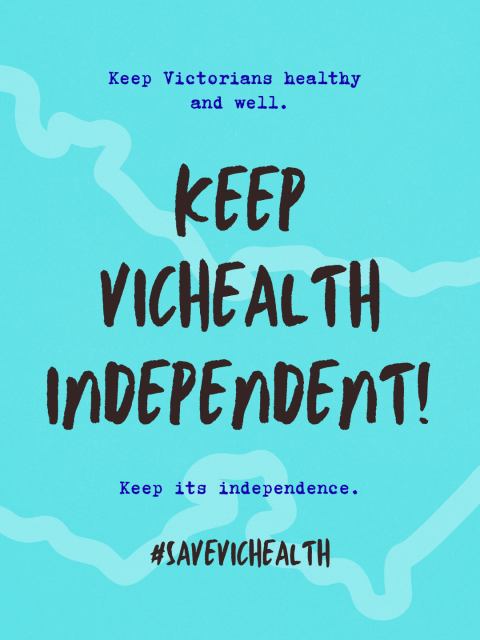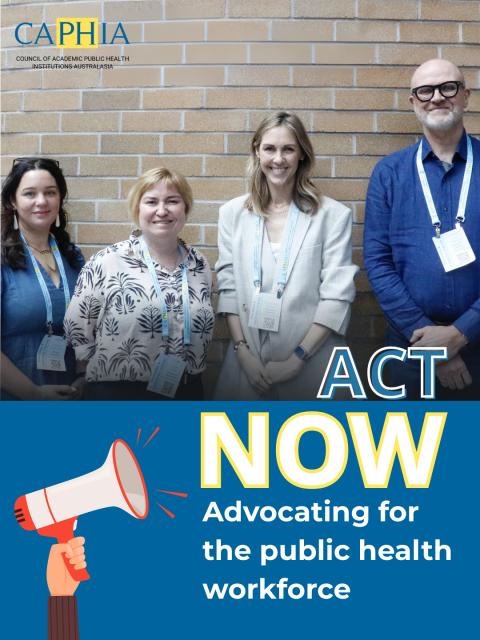Current Advocacy Campaigns

Save VicHealth
CAPHIA has actively joined over 350 public health leaders and organisations to call for reversal of the decision to absorb VicHealth into the Victorian Department of Health. The planned merger will weaken prevention at the worst possible time. Victoria should be increasing investment in prevention and public health workforce capability, not dismantling the very institutions that make that possible.
- Read CAPHIA’s media release here
- Read the open letter to Victorian Premier Jacinta Allan CAPHIA Co-signed here.
- Read the letter sent to Treasurer Jaclyn Symes here (an identical letter was also sent to Jacinta Allan)
- CAPHIA in the news:
How you can help:
- Sign the petition
- Follow Friends of VicHealth on Linkedin
- Write to the Premier or your local Minister. Get the template and guide here.

Save Public Health at UTS
CAPHIA continues to work with leadership at the University of Technology Sydney and the broader community to advocate for reversal of the decision to dissolve the School of Public Health and all education programs.
- Media Statements:
- CAPHIA in the news:

Standing up for Public Health Education
As articulated in the CAPHIA Strategic Plan 2025 – 2027, we seek to optimise understanding of and investment in academic public health as a cornerstone of health system resilience, equity, and sustainability. The following position statements outline the critical role of academic public health in educating and investing in a resilient, skilled workforce capable of meeting complex local and global health challenges.
Position Statements:
Past Publications – Spotlight
- The submission in response to the enquiry into the Commonwealth’s response to COVID-19 Response. CAPHIA urged the Government to urgently invest in the infrastructure of key enablers to reduce risk and better prepare and respond to the next event. These enablers include IT, data, education and training, preventive health, communications and the workforce.
- The Voice – support of the Uluru Statement from the Heart and the establishment of a Voice to Parliament, open letter of support and acknowledgement of referendum result.
- National Consumer Strategy for Health and Wellbeing Submission
- Response to the draft inaugural Australian Health and Climate Strategy. This focuses on investment, recognising that that workforce is a crucial enabler in a healthier planet.
- The Position Statement: Educating the Public Health Workforce was developed to formally reflect CAPHIA member views on:
- The scope of public health and the diversity of public health practitioners
- CAPHIA’s role in public health education across Australasia
- Considerations when developing public health education
- The connection between education and the public health workforce
- The reasoning for high quality, structured education for the public health workforce
- The Response to the Australian Government discussion paper, Role and Functions of an Australian Centre for Disease Control. The submission focused on our core expertise of academic public health with recommendations centering on the development of a world class workforce, facilitating rapid response to health threats and supporting leadership on preventive health
- Call to action – Public Health for a sustainable future – outlines the 1) key responsibilities of public health educators, 2) curriculum priorities and 3) teaching and learning strategies to develop and deliver curricular which enables a sustainable and equitable future. The article was published in the April 2023 edition Australian and New Zealand Journal of Public Health.
- CAPHIA and the Public Health Association of Australia (PHAA) published an open letter calling for investment in public health in the Australian and New Zealand Journal for Public Health through four key initiatives:
- Increase the number of Commonwealth Supported Places for public health undergraduates and postgraduates
- Develop and fund a national public health officer training program
- Introduce Government-funded micro-credentials to ensure continued high standards of service delivery
- Include CAPHIA and educators and researchers of its member institutions in a review of the public health workforce and in policy and program planning.